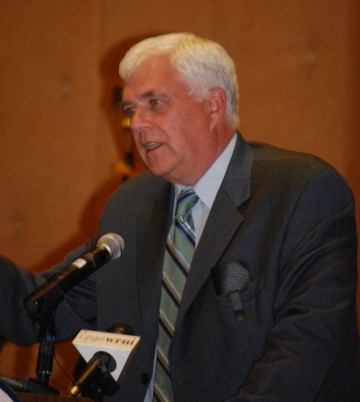Bi-Weekly Paycheck Legislation Gets Pushback From Employees
Wednesday, May 22, 2013
Legislation unanimously approved by the Rhode Island House Committee on Finance would enable private industry to pay employees less than weekly -- and in spite of criticism from labor led opposition citing disenfranchisement of already cash-strapped employees, the committee was won over by representation by the business community who testified in favor of creating a more business friendly environment.
Paul DeRoche, Executive Director and Lobbyist for Rhode Island Retail Federation, said that he and his supporters had been trying to get this bill out of committee for the last 17 years. “Finally,” said DeRoche, “we see some light at the end of the tunnel.”
The passage of the bill through committee to the floor of the house is extremely encouraging to DeRoche, a former business owner of a tennis club in Lincoln, RI. “I had 25 employees on payroll and it was costly to have to pay them weekly. If business could reduce the cost of weekly payroll it could equal an increase in jobs.” He also pointed out that every other state in the country allows this practice.
GET THE LATEST BREAKING NEWS HERE -- SIGN UP FOR GOLOCAL FREE DAILY EBLASTRepresentatives of Rhode Island’s AFL-CIO chapter, on behalf of Rhode Island’s labor force, argue against the bill. Rhode Island Council President, George Nee and Secretary Treasurer, Maureen Martin said, “Passage of legislation that permits bi-weekly pay would be an economic injustice to the working people of our state. Many employers, especially larger ones, would be able to make interest income by holding workers' wages an extra week."
"Additionally, in the case of bankruptcies, the workers could be owed at least an extra week of wages. Unfortunately, under the bankruptcy laws of our state and nation, workers must wait until all taxes and secured creditors are paid before they receive the wages for the hours they worked.”
The Bill
2013 -- H 6065 AN ACT RELATING TO LABOR AND LABOR RELATIONS - PAYMENT OF WAGES, Introduced By: Representatives Hearn, Cimini, O'Brien, Nunes, and Marcello proposes: Every employee other than employees of the state and its political subdivisions and of religious, literary, or charitable corporations shall be paid weekly all due wages from his or her employer, except those employees whose compensation is fixed at a biweekly, semi-monthly, monthly, or yearly rate. The director may, upon written petition showing good and sufficient reason, permit the employer and its affiliates to pay wages less frequently than weekly provided: The employer provides proof of a surety bond or other sufficient demonstration of security in the amount of the highest biweekly payroll exposure in the preceding year for the employees subject to the petition.
The Major Change
Language stricken from from current law is as follows:
(1) The employer and its affiliates have more than two thousand five hundred (2500) employees located in Rhode Island; (2) The employer's average payroll exceeds one hundred thirty-five percent (135%) of the average compensation of all employees in the state as defined in subsection 42-13 64.11-2(c); (3) The employer makes payment of wages regularly on a predesignated date no less 14 than twice per month.
Rhode Island law presently requires that employers pay workers in the private sector on a weekly basis. Efforts to change this law and allow employers to pay workers on a bi-weekly basis have come before the General Assembly for several years.
Lead sponsor of the proposed legislation, Representative Joy Hearn (D – East Providence, Barrington) said “I just think, in order to get out of the economic doldrums, we should make this available to businesses here.” While Representative Patricia Morgan (R – Coventry, Warwick and West Warwick) described the past practice as “hostile to Rhode Island businesses.” She went on to say if Social Security and welfare recipients can budget for a month, employees could make it for two weeks.
Mark A. Mancinho, Political and Legislative Director for RI AFL-CIO said, “This bill is irrelevant to a productive and effective economic development policy.” He went on to say, “Although dressed up in economic development clothing for public relations purposes, this is at best a convenience issue for some big corporations at the expense of the workers. What this bill will do is create an unnecessary burden on low-income families, who are totally reliant on a weekly paycheck and force them to prioritize their needs (i.e.; food, medication, utility payments, rent, mortgage payments, etc.). As for our members, (who are construction workers, utility workers, food store employees, nursing home workers, hotel employees, manufacturing workers, transit workers, school bus drivers, and more) who earn their pay by working hard and deserve to be paid in a timel
Related Articles
- NEW: 60-70 Layoffs Coming at Department of Labor & Training
- NEW: Labor Department Extends Hours For TeleServe Service
- Organized Labor Claims Victory: What it Means for RI
- PowerPlayer: Labor Leader Maureen Martin
- RI Taxpayers Urges Labor Comm to Reject Binding Arbitration for Teachers
- Rhode Island’s Labor Force Smallest Since 2005
- Travis Rowley: Inside the Mind of a Labor Leader
- Guest MINDSETTER™ Dan Wall: Labor and Management are Collaborating for Achievement
- Will the State & Organized Labor Reach a Deal on Pension Reform?




